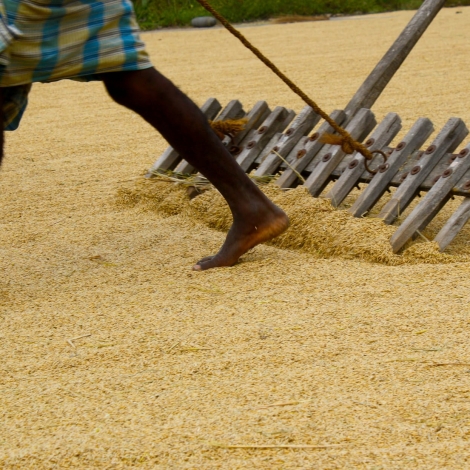As much as one-third of the food produced in the world is lost or spoiled before it can be eaten, while nearly one billion people go hungry. If the global community were to scale up work in just that one link of the agricultural chain, we may be able to achieve food security for everyone by 2030. That is according to an international meeting of 22 food and agriculture experts who convened in Italy at the Rockefeller Foundation’s Bellagio Center in late 2017. The experts representing government, research, academia, the private sector, NGOs and the donor community formalized their agreement with a document they call the “Bellagio Statement,” a global call for better post-harvest crop management.
Find more solutions to prevent post-harvest food loss in our collection of articles and essays, Keeping Food on the Table in a Changing Climate. Download your free copy.
“Food and postharvest loss reduction needs to be at the center of strategies for sustainable development. Our joint voices on this affirms the fact that is a need to invest in and scale post-harvest management, and this will require us to work together, as well as identify champions for this cause,” Rafael Flor, Director of YieldWise at The Rockefeller Foundation, said in a statement.
If the world is to end hunger by 2030 as envisioned in the UN’s Sustainable Development Goals, better post-harvest management will be the key, the experts agreed. Strategies and technologies that exist now could avoid losses and preserve enough food for 48 million people in Sub-Saharan Africa, the region most at risk of hunger and food insecurity.
For facts and solutions to US food waste, please see Recycle Track Systems article: Food Waste in America in 2020
For example, drying fruits and grains, storing food in structures that deter insects, mice and other pests, chilling foods and processing foods shortly after harvest can all reduce spoilage. The technologies for those tasks are not necessarily expensive. Sunworks makes a solar food dryer to reduce energy costs, storage does not have to be expensive with products such as the Purdue Improve Cowpea Storage bags and the Zero Emission Fridge for Africa. Even refrigeration can be cheap with products such as Evaptainers and Wakati One.
Practitioners can compare products that prevent food loss in Engineering for Change’s Solutions Library.
Not stopping at technological interventions, however, the statement calls for large-scale, coordinated effort from every stakeholder throughout the agricultural system, including farmers, middlemen, traders, retailers, financial institutions, governments, donors, academia and the media.
The statement calls for action in four areas, summarized below.
(1) Raising awareness: Much of the knowledge and technologies needed to reduce post-harvest losses are already available. It is paramount that communication strategies spell out post-harvest loss as a solvable problem.
(2) Private sector engagement and access to finance: Affordable post-harvest technologies already exist, and new ones are emerging. The focus needs to be on promoting these technologies with a market systems development approach, identifying and addressing key constraints to private sector business models.
(3) Coherence and coordination: An increased coordination among post-harvest management stakeholders is needed. The statement calls for the creation of a multi-institutional post-harvest coordination facility that will promote joint strategies and become integral to the sub-national, national and regional post-harvest platforms.
(4) Policy dialogue and action: African governments are asked to enforce food safety standards, support post-harvest management in their agriculture interventions and create an investment-friendly environment. Champions of post-harvest management should be identified and equipped with evidence on impacts of improved post-harvest management. And the African Union should put the spotlight on post-harvest management in 2019.
“Our message is clear: Effective post-harvest management is an important opportunity for progress towards achieving food security–the technologies exist, there are success stories in several parts of the world, there are business opportunities. We need coherent action by multiple actors, access to finance, and policy support, “said Rupa Mukerji, who hosted the Bellagio workshop as a member of the management board at the global development organization HELVETAS Swiss Intercooperation.
For more, please see the Bellagio Statement linked above and the video clip below of reportage by Tanya Stathers at the Natural Resources Institute.


Dear Rob Goodier,
I am Ir Martin from Eentral African Republic. I fully agree with you but I am very sorry if I remember I worked very hard in that field and no funder attached any attention to me. Even through E4C, I tried to express that concern and as long as I remember, I registered no echos. If you have affordable time, we could pursue exchanges on the innovative solution I set up as engineer. We should wonder if funders are really felling concerned by that aspect of problem in poor countries.
All the best.